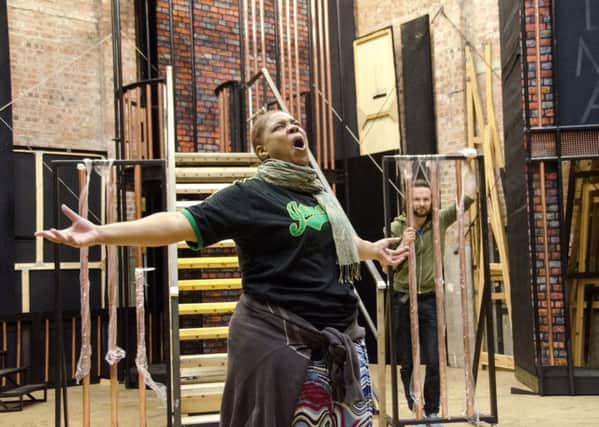Joyce McMillan: New era for Pitlochry Festival Theatre as it prepares to launch summer season


Yet for all that outward calm, 2018 is a year of change for Pitlochry, following the sudden resignation last November of the theatre’s artistic director, John Durnin. After a hugely successful 15 years in the job – during which he extended the Pitlochry season into autumn and winter, introduced a smash-hit strand of medium-scale musicals into its repertoire, and laid the ground for the ambitious expansion and rebuilding project known as Pitlochry 2021 – Durnin directed the company’s successful Christmas production of Singin’ In The Rain, wrote a passionate farewell programme note to the theatre and its audiences, and departed the scene, pursued by a faint sense of mystery.
If Durnin simply felt it was time to move on, that may well be because, in the autumn of 2017, he could see a team more than able to carry his work at Pitlochry forward. The 2018 season had already been planned, in collaboration with long-time Pitlochry associate Richard Baron, who has been named Pitlochry Season Director for 2018. And in October, Pitlochry appointed a new in-house associate director in Gemma Fairlie, who – after a successful 15-year directing career in London and elsewhere, since she left Edinburgh University – will not only direct three of this year’s shows, including the 2018 Christmas show, The Wizard Of Oz, but will take responsibility for the planned expansion of Pitlochry’s youth, community and children’s theatre programme; the theatre’s first Youth Theatre performance will take place in August.
Advertisement
Hide Ad“I grew up in the south of England, but in a family with very strong Scottish connections,” says Fairlie, who also runs a London-based circus company called Light The Fuse. “So I’ve been aware of Pitlochry Festival Theatre since I was a very young child. My partner’s family are also from round here; and we both felt it was time to begin to make our way back. I talked to John Durnin last year, and really began to understand the scale of what this theatre does, and how it’s hoping to expand its work; I felt I wanted a completely new challenge, and now I’ve got one.”
Among the challenges Fairlie will face this year is the task of directing two summer season shows. The first is Jim Cartwright’s award-winning 1992 play-with-songs The Rise And Fall Of Little Voice, about a girl with a magical voice struggling to emerge from a poor working-class background in 1980s northern England, and from the erratic loving care of her good-time-girl single mum. And in complete contrast, Fairlie’s second show will be Rodney Ackland’s late-1940s play Before The Party, based on a short story by Somerset Maugham, about a social-climbing middle-class family in Surrey after the Second World War. Fairlie is delighted that like Little Voice, Before The Party features several strong and central female characters. “I’m really happy that so many of our plays this year tell really strong women’s stories,” she says. “We have nine women and eight men in our 2018 company, perhaps the first time we’ve ever had a majority of women, and that reflects the character of the work we’re producing.”
The season will also include a production of JM Barrie’s smash-hit 1901 Regency comedy Quality Street, directed by Liz Carruthers. The brunt of this year’s summer directing work, though, will be taken on by Richard Baron, who has been directing at Pitlochry for more than 20 years, as well as winning widespread praise for other major productions in both England and Scotland, and co-running the Borders-based touring company Firebrand.
This year, Baron will step into Durnin’s shoes to take charge of the season’s opening musical, Chicago. He will also direct Tom Stoppard’s hugely clever 1974 comedy of art and politics, Travesties, and the season’s closing production of Rona Munro’s 2009 play The Last Witch; and to hear him talk about these productions is to gain an insight into the infinitely complex and rewarding process of creating each six-show Pitlochry summer season.
“I was hoping to direct Quality Street this year,” Baron says, “but had to pass that on, because of taking on Chicago. I’ve already directed Travesties in the past, so it seemed easiest for me to tackle that one; and then The Last Witch was always planned as a co-production between Pitlochry and Firebrand, which would tour after its Pitlochry run. Then, of course, there’s also the wonderful, unique Pitlochry job of finding an ensemble of actors who have all the skills we need – singing, dancing, often playing instruments, as well as acting – and who fit the plays in the season. This season, we had just two or three weeks to do it, after John left; and I’m delighted to say we made 17 offers, and 17 were accepted.
“Among other things, I really want to see Pitlochry evolve as a place where brilliant young Scottish talent can develop, through working on these very diverse seasons – we have an all-Scottish company for The Last Witch, for example, led by the wonderful Deirdre Davis. We’re also touring The Last Witch on to the Traverse and the Tron in the autumn; and I hope all of that will contribute to making Pitlochry feel ever more part of the Scottish theatre scene, and more included in the national conversation about where our theatre is going, and what it can achieve next.”
The Pitlochry Festival Theatre summer season opens on 25 May, and continues until 20 October, www. pitlochryfestivaltheatre.com